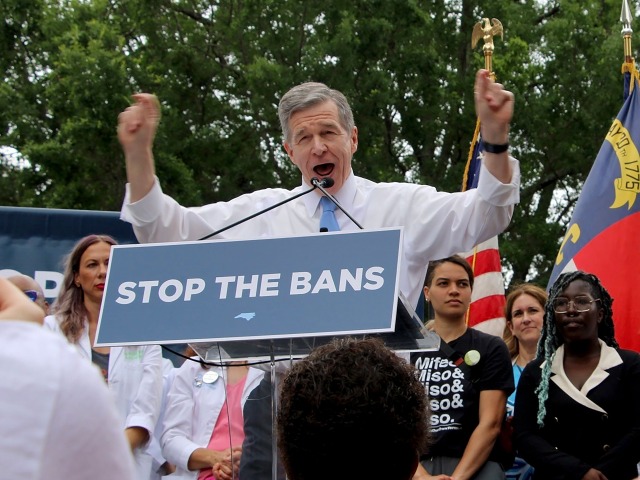The North Carolina legislature overrode Gov. Roy Cooper’s (D) veto of a bill restricting abortions within the state after 12 weeks, making North Carolina the latest state to increase restrictions after the U.S. Supreme Court overturned Roe v. Wade.
The state House voted 72-48 to override Cooper’s veto shortly after the state Senate voted 30-20 to do the same.
Currently, abortion is restricted after 20 weeks in North Carolina. However, the Care for Women, Children, and Families Act prohibits physicians from performing abortions after the 12th week of pregnancy.
Still, the law allows for exceptions in the case of rape and incest through 20 weeks and for abortion to occur through the 24th week if there is a “life-limiting anomaly.”
The bill also prohibits physicians who object to abortion “on moral, ethical, or religious grounds” from being mandated to perform procedures that would result in an abortion.

North Carolina Democratic Gov. Roy Cooper ignites a crowd of about 1,000 abortion-rights supporters gathered in Raleigh, NC, before he vetoes legislation banning nearly all abortions after 12 weeks, Saturday, May 13, 2023. (AP Photo/Hannah Schoenbaum)
Cooper vetoed the bill over the weekend.
“We are going to have to kick it into an even higher gear when that veto stamp comes down. If just one Republican in either the House or the Senate keeps a campaign promise to protect women’s reproductive health we can stop this ban,” Cooper said at a rally on Saturday, hours before he issued his veto.
However, North Carolina Republicans overrode Cooper’s veto after gaining a supermajority in the state House when Rep. Tricia Cotham switched parties from Democrat to Republican.
The 12-week abortion restriction will go into effect on July 1.
Democrats were outraged at the legislature’s vote, with one state senator calling the bill a “straightjacket” on women’s bodies.
“This bill is a slap in the face. It is a muzzle over our mouths, and it is a straightjacket on our bodies,” state Sen. Natasha Marcus (D) said.
“You as lawmakers are betraying your constituents and knowingly putting North Carolinians in danger,” state Sen. Gladys A. Robinson (D) said on the Senate floor. “This monster abortion ban will lead to substandard care.”

St Paul, Minnesota, Annual Pro-life abortion rally. The 2023 MCCL March for Life takes an opportunity to tell elected officials that unborn children and their mothers deserve better than no-limits abortion and won’t stop working until every innocent human being is protected. (Photo by: Michael Siluk/UCG/Universal Images Group via Getty Images)
However, North Carolina Republicans believe the bill is a “mainstream” approach to a sensitive topic.
“North Carolinians watching this debate, you are bearing witness to exaggerated and extremist objections from some Democrats,” state Sen. Vickie Sawyer (R) said. “Their anger is that this bill is mainstream and a common-sense approach to a very difficult topic.”
“I think this is really in line with what the majority of North Carolinians believe and so I’m not particularly concerned about the backlash,” state Sen. Amy Galey (R) said in an interview. “It’s a reasonable bill for this time.”
Galey also rejected the Democrats’ framing of the bill as a “ban.”
“A ban is when you can’t do something,” Galey said. “‘Ban’ is a really harsh word.”
Jordan Dixon-Hamilton is a reporter for Breitbart News. Write to him at jdixonhamilton@breitbart.com or follow him on Twitter.

COMMENTS
Please let us know if you're having issues with commenting.